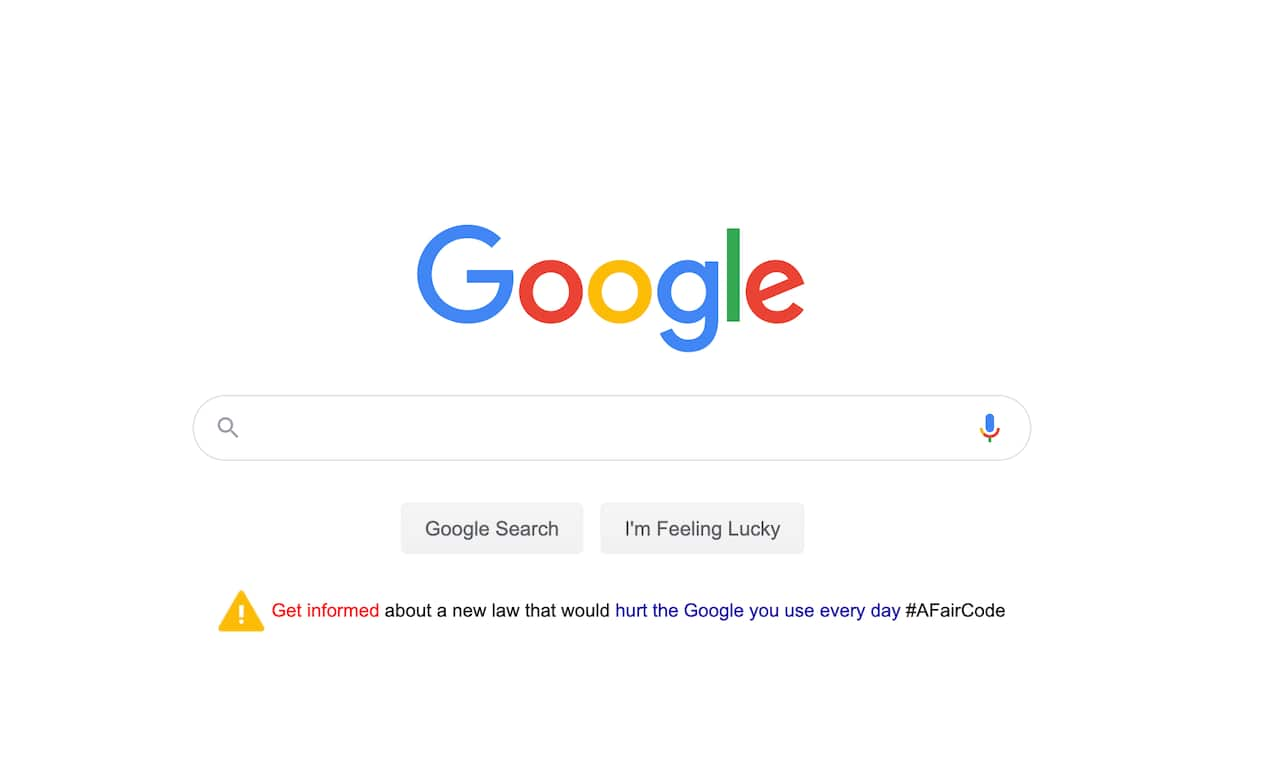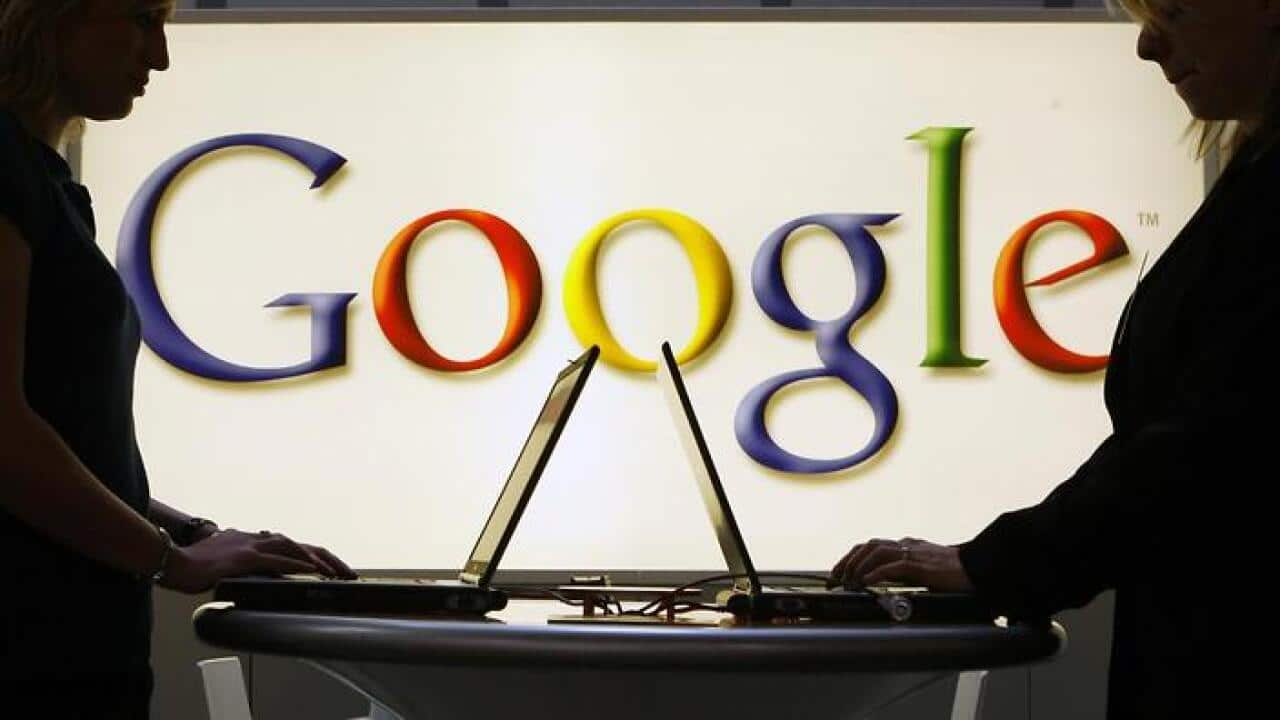The warning alerts popped up on Google and YouTube after the Australian Competition and Consumer Commission drafted a code which it says “will allow Australian news businesses to negotiate for fair payment for their journalists’ work”.
The ACCC claimed the code will address “a significant bargaining power imbalance between Australian news media businesses and Google and Facebook”.
But Google has moved quickly to criticise the proposed code in an open letter to Australians and several blog posts.

Managing Director of Google Australia, Mel Silva, claimed the ‘Draft News Media Bargaining Code’ would result in “a dramatically worse Google Search and YouTube”.
She also said the code “could lead to your data being handed over to big news businesses” and give an unfair advantage to news media “over everyone else who has a website, YouTube channel or small business”.
Facebook has also spoken out against the code in the past, claiming it could remove Australian news content from its platform and not suffer a “significant” impact to its business.
In its submission to the ACCC, Facebook said the code “is not healthy nor sustainable”.
“It is not reasonable to shift the burden and ask the hundreds of thousands of Australian small businesses who rely on digital advertising — especially in the midst of the coronavirus crisis and economic uncertainty— to bear the cost of subsidising the production of news,” Facebook said.
‘Google’s claims are misleading’
In parliament this week, federal Labor MP Andrew Leigh took “the trillion-dollar search engine” to task over what he dubbed “a misleading scare campaign”.
“From 2006 to 2016, the number of journalists in Australia fell by nine per cent. In the past decade, more than 100 local and regional papers have closed,” Mr Leigh said.
“Never has the Australian media been under more pressure, and never have we needed quality journalism more,” he added.
“Google makes hundreds of billions of dollars every year. It can afford to share a small slice of that with the news media that is fundamental to Australian democracy.”
A Google spokesperson told The Feed that “in the 2019 calendar year, Google Australia made a pre-tax profit of AU$134 million, resulting in AU$59 million of corporate income taxes payable, and invested almost AU$1 billion in our Australian operation.”
Google has also claimed that it provided Australian publishers with 3.44 billion clicks in 2019, which it says equates to approximately $218 million in value.
Dr Belinda Barnet is a Senior Lecturer in Media at the Swinburne University of Technology.
She said that Google is not being “entirely honest with users about how they’re going to be affected” by the code.
The code covers Google News and Google, as well as the news content Google search returns or hosts on its site, according to Dr Barnet.
She said the code requires Google to alert news organisations of changes to its algorithm that would “substantially impact” their ranking within 28 days.
The intention is to stop Google down-ranking content from news organisations, like it did in Spain back in 2014, according to Dr Barnet.
Dr Barnet said it would also prevent the company from avoiding content that requires payment or licensing.
Google has claimed the code could lead to the company being “forced” to hand over specific data to news organisations.
But Dr Barnet said Google has mischaracterised the code, as the data would not include user’s interactions with its services, such as their search history or any data that does not concern that outlet’s own news content.
Instead, she said the company would be asked to explain what data it collects from users interacting with the news outlet’s content on Google.
“Despite Google’s protests, they would not need to warn every time they make an update. Only if it will have a major impact,” Dr Barnet said.
The draft of the code also states that Google would be required to divulge “information about how the registered news business corporation can gain access to the data.”
‘YouTube not specified in the code’
Earlier this month, Google sent emails to YouTube users claiming the legal changes might mean they “could receive fewer views and earn less clicks” because the company would have to give news organisations information to game rankings.
They also claimed news organisations could “demand large amounts of money above and beyond what they earn on the platform, leaving fewer funds to invest in you, our creators”.
But Dr Barnet said “the code actually is not specifying that YouTube, in particular, has to enter into a revenue-sharing agreement with outlets.”
ACCC Chairman Rod Sims disputed Google’s claim and said Australian news outlets, and would not require Google to “share any additional user data” or “charge Australians for the use of its free services such as Google Search and YouTube”.
Tama Leaver, an Associate Professor in Internet Studies at Curtin University, agrees that Google has taken “a fairly provocative” approach by “selectively highlighting bits and pieces of proposed regulations” to play on “people’s fears”.
“I think if we looked at whether people are spending more time looking at news or more time looking at memes and funny cat videos, it’s probably the case that other content providers have drawn eyeballs away from news,” Dr Leaver told The Feed.
“But at the same time, if you took what traffic comes from those platforms away completely, I think these organisations would really struggle.”
What are some of the criticisms of the code?
In its blog post, Google claimed the code is “one-sided” and “unfair” and said before the code was proposed they had reached agreements with several Australian news organisations to pay them to license their content.
But Google put these negotiations with publishers like Crikey and The Saturday Paper on ice earlier this month.
Dr Leaver claims that rather than the code being a financial concern for Google, the company is more interested in protecting its intellectual property.
“Now Google is, for better or worse, a search engine, amongst other things, but its core business is the way that it decides which pieces of information matter. And that algorithm is its core piece of intellectual property,” Dr Leaver told The Feed.
Dr Barnet believes another concern Google could have is being required to check every single update it makes to see if it meets the notify threshold to warn news outlets.
For example, a change in ranking on Google search that might cause a 25 per cent reduction in traffic for an outlet.
While Dr Barnet said “most changes would not meet this threshold... Google faces fines if it fails to notify outlets of these changes within 28 days”.
Google claimed in its blog post that it launched 3,620 algorithm updates last year alone.
The other issue is that the code strongly favours commercial news providers and excludes organisations like the SBS and ABC, according to Dr Leaver.
“I think the current rules really do favour Rupert Murdoch more than anyone else, and I don't think that's the best way to go about setting rules to level the playing field, which is what the intention was at the beginning,” he said.

Dr Barnet said while the ACCC guidelines leave out SBS and ABC, they stipulate that an organisation’s income needs to be over $150,000 a year and that “your average country newspaper” would fit the bill.
She said while there is no clear number on how much Google and Facebook would be required to pay news organisations, it wouldn’t be a substantial amount for the company.
“It's ludicrous that Google is framing this as an existential threat when really the sums that we're talking about are minuscule in comparison to the income they generate from this country,” she said.
Dr Barnet said Google’s main concern is that if the Australian code is successful, it will create a global precedent that will require the company to pay for news.
“Bigger markets like the United States, China, United Kingdom, if they start asking for payment to news content as well, then it may have an impact on Google's business model,” she said.
But she believes Google and Facebook should recognise news as “premium content” that should be paid for.
“Classified advertising has now gone almost completely online and almost completely to these platforms and the source of revenue has dried up,” Dr Barnet said.
“[They should] recognise that actually, what's valuable is the content, not just the ads that surround it.”
Through award winning storytelling, The Feed continues to break new ground with its compelling mix of current affairs, comedy, profiles and investigations. See Different. Know Better. Laugh Harder. Read more about The Feed
Have a story or comment? Contact Us


